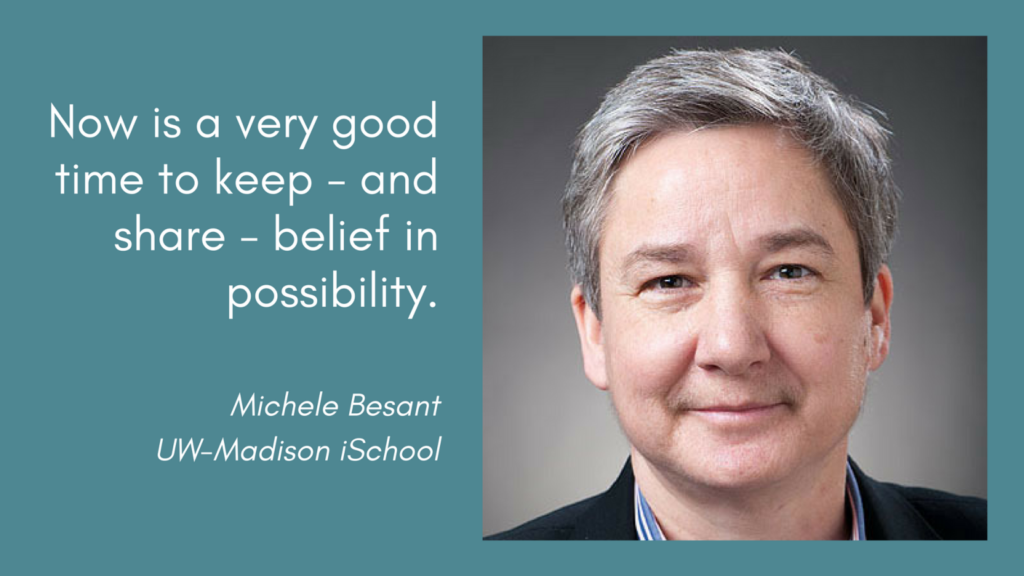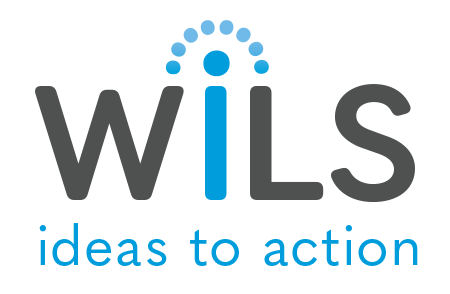
One of our greatest joys at WiLS is hearing our members tell the stories of the big and important work they are doing – interesting new projects or initiatives, or even interesting and new approaches to old projects. And, in addition to hearing about it, it makes us even happier when we can share those stories with other members. Each month, WiLS is proud to feature an interview with one of our library members. This month, we interview Michele Besant, Associate Director of UW-Madison Information School.
Why did you, personally, choose to work in libraries?
Similar to many others, I saw becoming a professional librarian a path to continue community work. In my case, just before starting my LIS degree I was working as a feminist bookseller in Madison at A Room of One’s Own — and as part of the Women in Print Movement with the simple goal of changing the world! I had actually left a part time job in a special academic library as an “information manager” to work full time at ARO3. Years previously I had worked in a student job in the Undergraduate Library at Urbana Champaign, as well as a summer gig at the Chicago Board of Trade Library. I’d also been a book binder. Oh–and my mother was a librarian. So in some ways, maybe it was fated.
What is unique about the culture of your community you serve? How do you influence it?
While not unique, it stands out to me that our culture is highly collegial. People are willing to engage wholeheartedly in sometimes difficult conversations and decisions. Ironically to me, I spend a fair amount of time with spreadsheets. I also get to help with student problems. I mention these things because both of these parts of my job do often present challenging realities, yet I find they allow me a lens that helps keep me open to new ideas. True, it helps that I am at heart an optimist. And I am very lucky in my colleagues. We generally do a good job of focusing on solutions rather than getting mired in frustration. I think my colleagues would agree that we work hard together, including “rumpussing” as needed, to sort out what we think are best directions.
It has been “interesting times” for some time on campus. But it is also the School’s culture to remember our relative privilege and take seriously the responsibility of working for public good. I often say that libraries are about hope and possibility. The UW-Madison as a strong public university is as well. And our UW-Madison Information School, born out of the Wisconsin Idea as the Wisconsin Library School continues this vision of working together on and off campus so we can improve lives.
I’m chuckling to myself about my answer because I challenge students to interrogate the aspirational language of the profession all the time. It can become more a “speech act” than have real meaning if we’re not careful. But it’s so important to hold on to this big picture. I also hope I inspire students whether they graduate identifying as a librarian, archivist, information manager, website designer, instructional technologist, metadata expert, or, or, or, to have their version of the library faith or spirit. Now is a very good time to keep—and share—belief in possibility.
What do you think is important to know about the community you work with? What helps you understand their needs?
I’ve sort of already answered this one. I’d just like to add that working with our students is a lot of fun. Adults who choose to return to school are in an exciting time of change in their lives—which can be also somewhat scary. So there is this kind of openness and exploration that I get to interact with. It’s an honor actually. And I learn from and with students all the time.
What big ideas are being worked on at your library? What problems are being solved?
I have numerous responses to this. First more big picture–
We’re trying to help create 21st century information professionals. For librarians this means continuing to provide education that values a variety of literacies, as well as wide ranging programming, providing access, advocating for intellectual freedom, i.e. all the things we have done for over a century AND increased attention to getting out of our buildings and expanding who we partner with and how we collaborate. Among other things, all 21st century librarians need planningandevaluation (yes, one word) skills, project management skills, high confidence in learning to learn the next needed IT skill, and face great demands on political and interpersonal savvy. We continue to evolve a curriculum. And we continue to work with our many partners to provide the beyond the classroom experience our students need. Thank you, partners across the state!
Thinking of current curriculum, Librarianship and Archives in a Digital Age remain robust concentrations, with Librarianship having a variety of foci possible. We’ve added concentrations that librarian and archivist students also take courses from: Data/Information Management & Analytics, UX & Information Technology, and Information Organization. We are launching a new capstone (post BA) certificate this fall, “Mad UX,” that provides skills for user experience design in digital spaces for professionals who may not be seeking a full master’s degree at this time. (Current master’s students can do analogous coursework via the UX & Information Technology concentration.) We have another certificate for analytics in the works and we’re in conversation with various units on campus about doing more related to cybersecurity. As libraries have increasing needs in this area, we see it as a valuable addition for our librarian students as well as to others.
I’d also like to mention just a few iSchool faculty research projects that I think may be of special interest. Some of you may have participated in Catherine Arnott Smith’s investigation of challenges for public library workers all over the country during Affordable Care Act enrollment. Data is still being analyzed and written up, but we know that among the challenges were not only the usual time and technology, but state governments that would not permit libraries to participate in information dissemination around the ACA. Sunny (Kyung-Sun) Kim has recently worked on undergraduates’ use of social media for information seeking. As you consider how to help students deal with the spread of misinformation/fake news through social media, some of her findings about the evaluation of information gained from social media may be helpful. And because I see privacy as one of the largest issues to be sorted out in our contemporary landscape, I want to highlight a couple areas of Alan Rubel’s research. He has studied e-content licensing and suggests many licenses have us legally agreeing to actions and policies we need to question – monitoring, for instance. In addition, Rubel has examined the use of data analytics in higher education and has questioned the range of information on students some colleges and universities are collecting.
Do you have anything else you’d like to share here?
I would like to share one more thing. The Jail Library Project, a collaboration between the iSchool‘s Jail Library Group, Dane County Library Service, and the Dane County Sheriff’s Office is 25 years old this summer. The project depends largely on donated materials and has always had a wider library/librarian community involvement. And I’d like to share a thank you with the many of you who have partnered with your donations over the years from an incarcerated individual. This was on a book request recently:
“Thank you volunteers for all you have done to get me through! I have one more week!”
There is a lot of work around corrections that needs to happen in Wisconsin and I sometimes question whether there is a related better use of volunteer time than the Jail Library Project. But the Jail Library’s user group depends on the service and almost 30% of the people incarcerated in the City County Building facility request materials each week. And where better to insert a little hope and possibility than in a jail?
——————
These interviews are part of a series of interviews with both WiLS library and vendor partners. Your feedback is appreciated. If you have any to offer on this article, or suggestions for upcoming interviews, contact Andrea Coffin at acoffin@wils.org.
